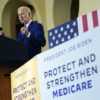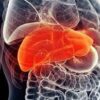FILE – A pupil wearing a protective mask arrives at a primary school Etablissement Primaire de l’ecole vaudoise, in Morges, Switzerland, 11 May 2020. Classroom teaching at primary and lower secondary schools will again be permitted. Switzerland is facing an exponential rise in coronavirus cases. But its federal government, hasn’t responded with new lockdown measures. Experts say that’s because the government’s anti-COVID policies face a crucial test at the ballot box. On Sunday Nov. 28, 2021, Swiss voters will cast ballots on a ‚COVID-19 law’ that has unlocked billions of Swiss francs in aid for workers and businesses hit by the pandemic. (Laurent Gillieron/Keystone via AP, File)
BERLIN (AP) — Swiss voters were having their say in a referendum Sunday on legislation which imposed the use of a special COVID-19 certificate that lets only people who have been vaccinated, recovered or tested negative attend public events and gatherings.
The vote offers a relatively rare bellwether of public opinion specifically on the issue of government policy to fight the coronavirus in Europe, currently the global epicenter of the pandemic.
The vote on the country’s “COVID-19 law,” which also has unlocked billions of Swiss francs in aid for workers and businesses hit by the pandemic, comes as Switzerland — like many other nations in Europe — faces a steep rise in coronavirus cases.
The Swiss federal government, unlike others, hasn’t responded with new restrictions. Analysts say it doesn’t want to stir up more opposition to its anti-COVID-19 policies before they face Sunday’s test at the ballot box. If the Swiss give a thumbs-up, however, the government may well ratchet up its anti-COVID efforts.
Polls suggest a solid majority of Swiss will approve the measure, which is already in effect and the rejection of which would end the restrictions — as well as the payouts. But in recent weeks, opponents have raised heaps of cash for their campaign and drawn support from abroad.
On Tuesday, Swiss health authorities warned of a rising “fifth wave” in the rich Alpine country, where vaccination rates are roughly in line with those in hard-hit neighbors Austria and Germany at about two-thirds of the population. Infection rates have soared in recent weeks.
The seven-day average case count in Switzerland shot up to more than 5,200 per day from mid-October to mid-November, a more than five-fold increase — with an upward curve like those in neighboring Germany and Austria.
Polls suggest a solid majority of Swiss will approve the measure, which is already in effect and the rejection of which would end the restrictions — as well as the payouts. But in recent weeks, opponents have raised heaps of cash for their campaign and drawn support from abroad.
On Tuesday, Swiss health authorities warned of a rising “fifth wave” in the rich Alpine country, where vaccination rates are roughly in line with those in hard-hit neighbors Austria and Germany at about two-thirds of the population. Infection rates have soared in recent weeks.
The seven-day average case count in Switzerland shot up to more than 5,200 per day from mid-October to mid-November, a more than five-fold increase — with an upward curve like those in neighboring Germany and Austria.
Copyright 2021 Associated Press. All rights reserved.




























You must be logged in to post a comment Login